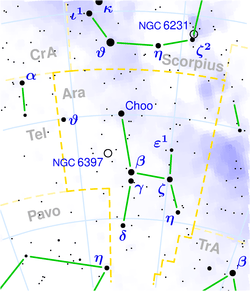Delta Arae
Delta Arae, Latinized from δ Arae, is the Bayer designation for a double star in the southern constellation Ara. It has an apparent visual magnitude of 3.62[2] and is visible to the naked eye. Based upon an annual parallax of 16.48 mas, it is about 198 light-years (61 parsecs) distant from the Earth.[1]
 δ Arae (lower center) in the Ara Constellation | |
| Observation data Epoch J2000.0 Equinox J2000.0 | |
|---|---|
| Constellation | Ara |
| Right ascension | 17h 31m 05.91272s[1] |
| Declination | –60° 41′ 01.8522″[1] |
| Apparent magnitude (V) | 3.62[2] |
| Characteristics | |
| Spectral type | B8 Vn[3] + G8 V[4] |
| U−B color index | –0.31[2] |
| B−V color index | –0.10[2] |
| Astrometry | |
| Radial velocity (Rv) | +10[5] km/s |
| Proper motion (μ) | RA: –54.01[1] mas/yr Dec.: –99.25[1] mas/yr |
| Parallax (π) | 16.48 ± 0.34[1] mas |
| Distance | 198 ± 4 ly (61 ± 1 pc) |
| Absolute magnitude (MV) | −0.31[6] |
| Details | |
| Mass | 3.56[7] M☉ |
| Radius | 3.12 ± 0.15[8] R☉ |
| Luminosity | 214[6] L☉ |
| Surface gravity (log g) | 3.81 ± 0.06[8] cgs |
| Temperature | 11,962 ± 86[8] K |
| Rotational velocity (v sin i) | 255[4] km/s |
| Age | 125[9] Myr |
| Other designations | |
| Database references | |
| SIMBAD | data |
Delta Arae is massive B-type main sequence star with a stellar classification of B8 Vn.[3] The 'n' suffix indicates the absorption lines are spread out broadly because the star is spinning rapidly. It has a projected rotational velocity of 255 km/s, resulting in an equatorial bulge with a radius 13% larger than the polar radius.[4] It has a magnitude 9.5 companion G-type main sequence star that may form a binary star system with Delta Arae.[7]
There is a 12th magnitude optical companion located 47.4 arcseconds away along a position angle of 313°.[9]
Etymology
Delta Arae was known as 龜三 (meaning: "the 3rd (star) of Guī") in traditional Chinese astronomy.[11][12]
Allen erroneously called both Delta and Zeta Arae "Tseen Yin" (天陰).[13] He probably confused the constellation "Ara" with "Ari", as 天陰 is actually in Aries.[11][12]
See also
- Ara (Chinese astronomy)
- Aries (Chinese astronomy)
References
- van Leeuwen, F. (November 2007), "Validation of the new Hipparcos reduction", Astronomy and Astrophysics, 474 (2): 653–664, arXiv:0708.1752, Bibcode:2007A&A...474..653V, doi:10.1051/0004-6361:20078357.
- Nicolet, B. (1978), "Photoelectric photometric Catalogue of homogeneous measurements in the UBV System", Astronomy and Astrophysics Supplement Series, 34: 1–49, Bibcode:1978A&AS...34....1N.
- Houk, Nancy (1979), "Michigan catalogue of two-dimensional spectral types for the HD stars", Ann Arbor : Dept. of Astronomy, Ann Arbor, Michigan: Dept. of Astronomy, University of Michigan, 1, Bibcode:1978mcts.book.....H.
- van Belle, Gerard T. (March 2012), "Interferometric observations of rapidly rotating stars", The Astronomy and Astrophysics Review, 20 (1): 51, arXiv:1204.2572, Bibcode:2012A&ARv..20...51V, doi:10.1007/s00159-012-0051-2.
- Evans, D. S. (June 20–24, 1966), "The Revision of the General Catalogue of Radial Velocities", in Batten, Alan Henry; Heard, John Frederick (eds.), Determination of Radial Velocities and their Applications, Proceedings from IAU Symposium no. 30, 30, University of Toronto: International Astronomical Union, p. 57, Bibcode:1967IAUS...30...57E.
- Anderson, E.; Francis, Ch. (2012), "XHIP: An extended hipparcos compilation", Astronomy Letters, 38 (5): 331, arXiv:1108.4971, Bibcode:2012AstL...38..331A, doi:10.1134/S1063773712050015.
- Shaya, Ed J.; Olling, Rob P. (January 2011), "Very Wide Binaries and Other Comoving Stellar Companions: A Bayesian Analysis of the Hipparcos Catalogue", The Astrophysical Journal Supplement, 192 (1): 2, arXiv:1007.0425, Bibcode:2011ApJS..192....2S, doi:10.1088/0067-0049/192/1/2.
- Fitzpatrick, E. L.; Massa, D. (March 2005), "Determining the Physical Properties of the B Stars. II. Calibration of Synthetic Photometry", The Astronomical Journal, 129 (3): 1642–1662, arXiv:astro-ph/0412542, Bibcode:2005AJ....129.1642F, doi:10.1086/427855.
- Ehrenreich, D.; et al. (November 2010), "Deep infrared imaging of close companions to austral A- and F-type stars", Astronomy and Astrophysics, 523: A73, arXiv:1007.0002, Bibcode:2010A&A...523A..73E, doi:10.1051/0004-6361/201014763.
- "del Ara". SIMBAD. Centre de données astronomiques de Strasbourg. Retrieved 2012-07-27.
- Chevalier, S., and Tsuchihashi, P., (1911): "Catalogue d'Étoiles fixes, observés a Pekin sous l'Empereur Kien Long (Qianlong (Chien-Lung)), XVIIIe siecle", Annales de l'Observatoire Astronomique de Zô-Sé.
- 伊世同 (Yi Shi Tong) (1981): 『中西対照恒星図表』科学出版社.(in Chinese)
- Allen, R. H. (1963). Star Names: Their Lore and Meaning (Reprint ed.). New York, NY: Dover Publications Inc. p. 64. ISBN 0-486-21079-0.
Further reading
- 大崎正次 (1987): 「中国の星座・星名の同定一覧表」『中国の星座の歴史』 雄山閣出版, pp. 312, 328.(in Japanese)